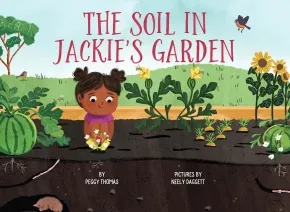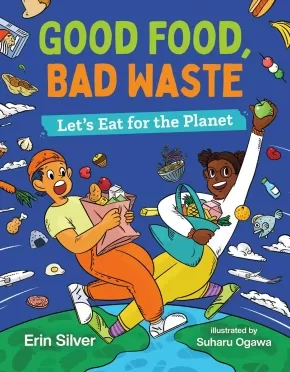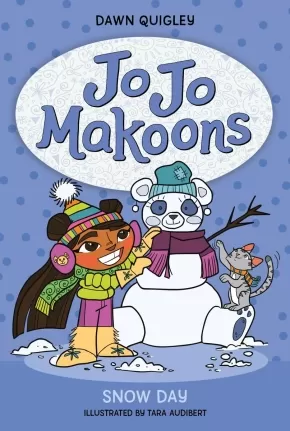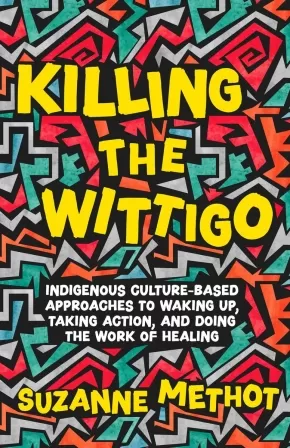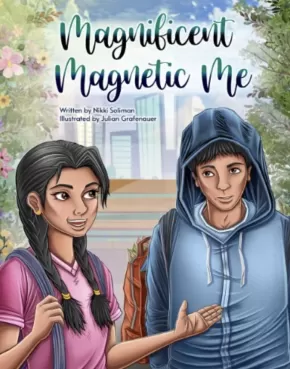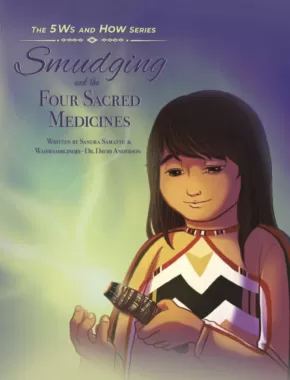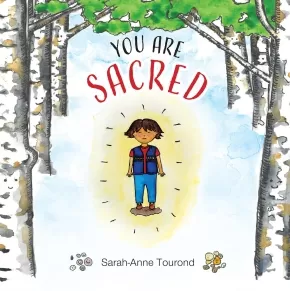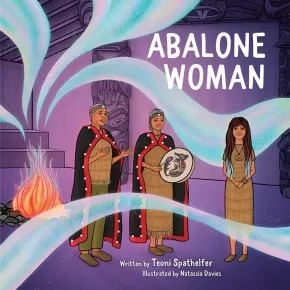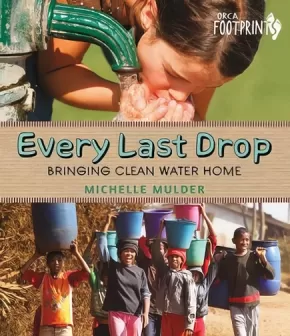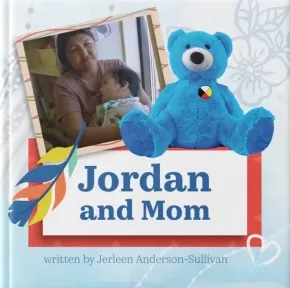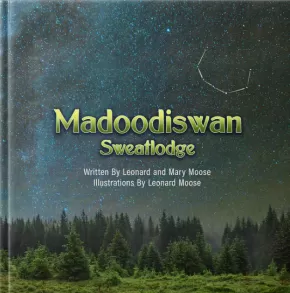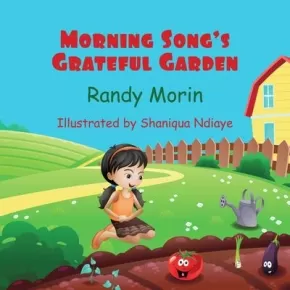
Health
16
-
30
of
77 Results;
Sort By
Go To
of 6
The Soil in Jackie's Garden (1 in Stock - Out of Print)
$24.95
Artists:
Format:
Hardcover
ISBN / Barcode: 9781948898164
Synopsis:
Synopsis:
Join Jackie and her garden friends in this charming picture book as they discover the wonders of gardening, soil secrets, and the magic of composting.
Jackie and her garden friends embrace the joys of planting a garden, nurturing and harvesting their own food, and recycling scraps to compost, ensuring that the magical cycle of growth and sustainability continues anew.
Science facts about soil, plants, pollinators, decomposers, and more are included on every spread.
A fantastic book to engage young readers in becoming environmental stewards, learning how to care for a garden, understanding a plant life cycle, discovering the power of pollinators and the importance of composting.
Written in the cumulative style of "The House that Jack Built," this playful celebration of how things grow, return to the earth, and grow again will inspire young readers to try their hands at gardening and composting.
Back matter includes information on the soil cycle and how to make a compost pile.
Educator Information
Recommended for ages 6 to 8.
Additional Information
32 pages | 11.00" x 8.50" | Hardcover
Traditional Inuit Games from Arviat
$15.95
Artists:
Format:
Paperback
Text Content Territories:
Indigenous Canadian; Inuit;
ISBN / Barcode: 9781774507957
Synopsis:
Synopsis:
"Inuit games have been played all over the Arctic for a very long time. They are played for fun, to practise survival skills, and as exercise."
Discover everything about Inuit games in Arviat, Nunavut! Practice skipping stones, building iglus, and challenge your friends to a race. Test your skills in the blindfold and jumping games and learn to play Inuit baseball.
Written by the late Inuit Elder Donald Uluadluak Sr. and accompanied by the author's original illustrations, this book is a fun introduction to Inuit games.
Educator Information
Recommended for ages 6 to 8.
Additional Information
32 pages | 6.00" x 8.00"| Paperback
You Are the Land
 $18.95
$18.95

Artists:
Format:
Hardcover
Text Content Territories:
Indigenous Canadian; First Nations; Anishinaabeg;
ISBN / Barcode: 9781771746328
Synopsis:
Synopsis:
Inspired by the Physical quadrant of the Anishinaabe Medicine Wheel, You Are the Land reminds young readers that they are a part of the world around them. With fun, rhyming text, each page compares our physical bodies to plants, animals, and the four elements, sharing an important message: You are the Land.
From the author of You Are Sacred, this is the second book in the All That You Are series.
Awards
- 2025-2026 First Nation Communities READ Award Longlisted
Reviews
"This warm, inviting book supports BC’s Core Competencies by helping children build self-awareness, a positive sense of identity, and care for the land and one another. Its key message—that we are the land—reminds young readers they are deeply connected to and share responsibility for the natural world. It’s a thoughtful resource for early K-2 classrooms." – Shannon D., elementary and middle school teacher, Indigenous Books for Schools
Educator Information
You Are the Land is a perfect read-aloud for children ages 3 to 6 in both classrooms and homes.
Curriculum Connections:
Early Literacy – listening, reading, discussing, and rhyming
Art – traditional Anishinaabe clothing and art
Health and Wellness – breath and balance, self-affirmation, connection to nature for physical health and wellness, and traditional medicines
Science – harmonious ecosystems, biodiversity of plants and animals with Indigenous cultural importance, environmental awareness
Social Responsibility – uplifting others and ourselves, respecting Mother Earth
Indigenous Knowledge and Traditions – teachings of the Anishinaabe Medicine Wheel, the Seven Generations, the Three Sisters, and All Our Relations
This book is included in the Indigenous Books for Schools database from the Association of Book Publishers of BC. It is recommended for K to 2 classrooms for English Language Arts, Physical and Health Education, Science, and Social Studies.
Series Information
You Are the Land is the second book in the All That You Are series. Through lyrical text and colourful watercolour illustrations, the All That You Are series uses the teachings of the Anishinaabe Medicine Wheel to remind children of their connection to the world around them. Each book in the series focuses on one quadrant of the Medicine Wheel representing one kind of wellness—Spiritual, Physical, Emotional, or Mental. A diagram and description of the Medicine Wheel are included at the back of each book. Also included are Anishinaabe Connections, which share more about Anishinaabe art, culture, and traditions explored in the text and illustrations. Books in the All That You Are series are best suited for children ages 3 to 6 and make wonderful read-alouds in classrooms and homes.
You Are Sacred is the first book in the series.
A percentage of proceeds from the All That You Are series is donated to the Indian Residential School Survivors Society to support their efforts in advocacy for justice and healing. To find out more information, please visit https://www.irsss.ca/.
Additional Information
24 Pages | 8" x 8" | Hardcover | ISBN: 978-1-77174-632-8
Good Food, Bad Waste: Let's Eat for the Planet
$26.95
Artists:
Format:
Hardcover
ISBN / Barcode: 9781459830912
Synopsis:
Synopsis:
A deep dive into why humans waste so much food and the consequences for people and the planet
Around the world, a billion tons of food gets thrown away every year, even when hundreds of millions of people suffer from hunger. A lot of what we don't eat ends up rotting in landfills which contributes to global warming. The good news is that many governments, communities and individuals are working hard to tackle this giant problem. You can be part of the solution, starting in your own home—and working together, we can decrease our overall waste and make sure all people have food security. Plus, by reducing food waste, we can also fight climate change!
With inspiring profiles of food-waste activists and tasty tidbits on things like best-before dates, Good Food, Bad Waste offers much food for thought.
Reviews
“A thorough, upbeat look at the problem of food waste proposing some individual responses.”— Kirkus Reviews
“Ideas presented offer an exciting potential source for research and personal activism…A highly readable book with a topic that hits close to many homes. Highly Recommended.”— School Library Connection
Educator & Series Information
Recommended for ages 9 to 12.
This book is part of the Orca Thinks series.
Various resources for this title are available to download
- Discussion Guide - Good Food, Bad Waste: Lets Eat for the Planet
- Poster: Good Food, Bad Waste: Lets Eat for the Planet
- Activity - Good Food, Bad Waste: Lets Eat for the Planet
Additional Information
96 pages | 7.00" x 9.00" | Hardcover
Jo Jo Makoons: Snow Day
$8.50
Format:
Paperback
Text Content Territories:
Indigenous American; Native American; Anishinaabeg; Ojibwe (Chippewa);
ISBN / Barcode: 9780063015449
Synopsis:
Synopsis:
Oh, snow day, snow day, what a very fun no-school day! Jo Jo Makoons is back in the third book in this favorite chapter book series, and she’s planning the very best version of the winter Olympics that her Ojibwe community has ever seen…
Jo Jo Makoons has noticed that the family members she loves most—Mama, Kokum, and even her cat, Mimi—all have their own ways of being healthy. So when Teacher says that their class will be learning about healthy habits, Jo Jo is ready to be neighborly by helping everyone around her be healthy too.
After a snowstorm shuts down her Ojibwe reservation, Jo Jo uses her big imagination and big personality to help both Elders and classmates alike. Because after all, being healthy means being together!
With her signature heart and hilarity, in this third book in her chapter book series, Jo Jo Makoons shows care for her community as only this vibrant young girl can.
Reviews
"When school is canceled due to a snowstorm, Jo Jo proposes that she and her classmates hold their own “winner” Olympics and invite Elders to participate, too. What unfolds are the Ojibwe Olympics, complete with lip-pointing races and round-dancing, and Jo Jo learns that being in community is an important part of being healthy. This third book in Quigley’s (Turtle Mountain Band of Ojibwe) series is a charmer, with the spunky, bighearted protagonist continuing to raise laughs and inspire. Readers will be enchanted by Jo Jo’s voice and Audibert’s (of Wolastoqey and French heritage) cute, cartoon-style illustrations, rendered in grayscale. Ojibwe values are woven deftly into the fabric of the story. A glossary of the Ojibwe and Michif words enhances the reading experience. Jo Jo’s classmates are diverse in the artwork.An absolute delight." — Kirkus Reviews
Educator Information
Recommended for ages 6 to 10.
This is the third book in the Jo Jo Makoons series.
The first book in this acclaimed chapter book series was an American Indian Youth Literature Award Honor Book; a best book of the year from Kirkus Reviews, School Library Journal, American Indians in Children's Literature, and the Chicago Public Library; a Charlotte Huck Award Honor Book; and a Cooperative Children's Book Center CCBC Choices selection.
Additional Information
96 pages | 5.12" x 7.62" | Paperback
Killing the Wittigo: Indigenous Culture-Based Approaches to Waking Up, Taking Action, and Doing the Work of Healing
$29.95
Format:
Paperback
ISBN / Barcode: 9781770417243
Synopsis:
Synopsis:
An unflinching reimagining of Legacy: Trauma, Story, and Indigenous Healing for young adults.
Written specifically for young adults, reluctant readers, and literacy learners, Killing the Wittigo explains the traumatic effects of colonization on Indigenous people and communities and how trauma alters an individual’s brain, body, and behavior. It explores how learned patterns of behavior — the ways people adapt to trauma to survive — are passed down within family systems, thereby affecting the functioning of entire communities. The book foregrounds Indigenous resilience through song lyrics and as-told-to stories by young people who have started their own journeys of decolonization, healing, and change. It also details the transformative work being done in urban and on-reserve communities through community-led projects and Indigenous-run institutions and community agencies. These stories offer concrete examples of the ways in which Indigenous peoples and communities are capable of healing in small and big ways — and they challenge readers to consider what the dominant society must do to create systemic change. Full of bold graphics and illustration, Killing the Wittigo is a much-needed resource for Indigenous kids and the people who love them and work with them.
Educator Information
Recommended for ages 12 to 17.
The adult version of this book can be found here: Legacy: Trauma, Story, and Indigenous Healing
Additional Information
160 pages | 5.50" x 8.50" | Paperback
Magnificent Magnetic Me
$19.99
Artists:
Format:
Paperback
Text Content Territories:
Indigenous Canadian;
ISBN / Barcode: 9781990297434
Synopsis:
Synopsis:
Métis writer and educator Nikki Soliman walks children through the importance of mental health and wellness in Magnificent Magnetic Me. This book examines the importance of embracing the tools needed to stay positive. It teaches about the power of thoughts and words and the energy we attract.
Educator Information
Recommended for grades 5 to 8.
Additional Information
32 Pages | Paperback
Smudging and the Four Sacred Medicines
$24.95
Format:
Hardcover
Text Content Territories:
Indigenous Canadian;
ISBN / Barcode: 9781990297557
Synopsis:
Synopsis:
The 5 Ws and How Series has been created to help All of Us learn and understand who we are, as Indigenous Peoples across Turtle Island.
The first book in this series, Smudging and the Four Sacred Medicines, will guide you as you learn about Sacred Medicines and Smudging. Learn how Smudging helps us stay strong and connected to All of Creation. Indigenous Peoples have always Smudged and use Sacred Medicines in Ceremony, for Healing, and in daily life. This book shows which Medicines to use in a Smudge, how to Respect the Spirit of the Medicines when Smudging, and reminds us that Smudging is for Everyone!
Educator & Series Information
Recommended for grades 2 to 5.
This book is part of The 5 Ws and How Series.
Includes information about who, where, how, and when to smudge.
Shares information about the four sacred medicines (tobacco, sweetgrass, sage, cedar).
Additional Information
20 Pages | Hardcover
You Are Sacred
 $18.95
$18.95

Artists:
Format:
Hardcover
Text Content Territories:
Indigenous Canadian; First Nations; Anishinaabeg;
ISBN / Barcode: 9781771746298
Synopsis:
Synopsis:
Anishinaabe teachings share that all children are Sacred. Still new to this world, they are close to the Spirit world and deeply connected to Mother Earth.
Rooted in this belief, You Are Sacred is a lyrical story that encourages the spiritual wellness of young learners. Each page is a reminder that we are all relations and can find solace in the plants and animals, land and sky, and Ancestors around us. Using the teachings of the Spiritual quadrant of the Anishinaabe Medicine Wheel, this affirmational picture book shares a heartwarming message for children: You are Sacred.
This is the first book in the All That You Are series.
Awards
- 2024-2025 First Nation Communities READ Award Longlisted
- Honourable Mention in the Sunshine Coast Writers and Editors Society Indigenous Voices Book Award
Educator Information
You Are Sacred is a perfect read-aloud for children ages 3 to 6 in both classrooms and homes.
Curriculum Connections:
Early Literacy – listening, reading, and discussing
Art – traditional Anishinaabe clothing and art
Health and Wellness – focusing on breath and balance, self-affirmation
Science – harmonious ecosystems, biodiversity of plants and animals with Indigenous cultural importance, environmental awareness
Social Responsibility – uplifting others and ourselves
Indigenous Knowledge and Traditions – teachings of the Anishinaabe Medicine Wheel, the Seven Generations, and All Our Relations
Series Information
You Are Sacred is the first book in the All That You Are series. Through lyrical text and watercolour illustrations, this series shares the teachings of the Anishinaabe Medicine Wheel to remind children of their connection to the world around them. Each book is inspired by one quadrant of the Medicine Wheel that represents an aspect of wellness—Spiritual, Physical, Emotional, or Mental. A diagram of the Medicine Wheel is included at the back of the books. Anishinaabe Connections are also included to share more about Anishinaabe art, culture, and traditions explored in the text and illustrations.
You Are the Land is the second book in the series.
A percentage of proceeds from the All That You Are series is donated to the Indian Residential School Survivors Society to support their efforts in advocacy for justice and healing. To find out more information, please visit https://www.irsss.ca/.
Additional Information
24 Pages | 8" x 8" | Hardcover | ISBN: 978-1-77174-629-8
Abalone Woman (PB)
$12.95
Artists:
Format:
Paperback
Text Content Territories:
Indigenous Canadian; First Nations; Heiltsuk (Bella Bella);
ISBN / Barcode: 9781772034271
Synopsis:
Synopsis:
A vivid dream teaches Little Wolf about courage and acceptance of those who are different, and inspires her to show her daughters and their classmates how to be proud of their diverse cultural backgrounds.
Throughout her life, Little Wolf has been troubled by the injustice she sees all around her. When she was young, she was bullied for her Indigenous heritage. Her mother, White Raven, spent ten years in a residential school, separated from her family and isolated from her culture. Little Wolf’s own children are growing up in a different, more open society, but hatred and racism still exist. Little Wolf worries about the world her daughters will inherit. One night, a vivid dream helps her realize her own strength as a leader and peacemaker in her community. Told with powerful imagery and symbolism, Abalone Woman is the third book in the Little Wolf series, which presents themes of racism, trauma, and family unity through relatable, age-appropriate narratives.
Educator & Series Information
Recommended for ages 4 to 8.
This is the third book in the Little Wolf series.
This book is available in French: Femme Ormeau
Additional Information
32 pages | 9.00" x 9.00" | Paperback
Every Last Drop: Bringing Clean Water Home
$14.95
Format:
Paperback
ISBN / Barcode: 9781459835108
Synopsis:
Synopsis:
In the developed world, if you want a drink of water you just turn on a tap or open a bottle. But for millions of families worldwide, finding clean water is a daily challenge, and kids are often the ones responsible for carrying water to their homes. Every Last Drop looks at why the world’s water resources are at risk and how communities around the world are finding innovative ways to quench their thirst and water their crops. Maybe you’re not ready to drink fog, as they do in Chile, or use water made from treated sewage, but you can get a low-flush toilet, plant a tree, protect a wetland or just take shorter showers. Every last drop counts!
Reviews
"This engaging book takes on the important task of explaining clean drinking water to middle school students...The writing style is a very accessible mixture of personal travel stories and interesting facts ..It can be hard to find good books on sustainability issues for middle school students. This well-written book will be a welcome addition to any classroom or library collection. It will support any research on water usage and will be popular with students interested in getting involved with environmental issues. Highly Recommended." — CM Magazine
"Mulder’s book will make readers stop and calculate...Lavishly illustrated with everything from woodcuts to photographs, the book is far from downbeat and scolding...Mulder writes with a clean, no-nonsense style...Informative, attractive and alarming—readers will think twice before leaving the water running as they brush their teeth." — Kirkus Reviews
Educator & Series Information
Recommended for ages 9 to 12.
This book is part of the Orca Footprints series. Kids today inhabit a world full of complex—and often mystifying—environmental issues. Orca Footprints aim to help kids answer their questions about the state of the natural world with well-researched, simply-expressed information and powerful images. With topics such as food production, water, cycling and sustainable energy, these books will inspire kids to take action.
Additional Information
48 pages | 8.00" x 9.50" | Paperback
Heartbeat of the Earth: A Handbook on Connecting Children to Nature through Indigenous Teachings
$47.75
Artists:
Format:
Paperback
Text Content Territories:
Indigenous Canadian;
ISBN / Barcode: 9781778258701
Synopsis:
Synopsis:
Nature is a place to both play and learn. The physical self is moving and active, the mental self is thinking and questioning, the emotional self is feeling and experiencing, and the spiritual self is connecting and thankful. We see what we have been taught to see. We love and respect our natural surroundings when we see ourselves as belonging to that community. This resource leads readers on a rich learning journey as they deepen their connections to nature and culture.
The activities inside instill traditional teachings of respect, honour, resourcefulness, and humility in children. This handbook is intended to inspire parents, caregivers, and educators to provide children with meaningful outdoor experiences interwoven with traditional indigenous knowledge.
Educator Information
For use with children.
Table of Contents
Introduction
The Power of Ceremony
- Introduction
- Ceremony and Daily Life
- Sunrise Ceremony
- Nature Picnic
- Sharing
- Navajo Forgiveness Ceremony
- Smudging Ceremony
Mindfulness: Meditation of Gratitude
- Introduction
- Gratitude
- Silent Study
- Sensory Wake-Up
- Walking Meditation
- Guided Meditation
- Nature Meditation
- Traditional Prayers
We Are All Related
- Honouring the Plants, Earth and Water
- Medicine Wheel Teachings in Nature
- Water is Life
- Find the Rock Game
- Adopt a Tree
- Read a Tree
- Earthing
- Build a Nature Structure
Swimmers, Walkers and Fliers
- The Animal People
- Walk Like the Animal People
- Tracking
Indigenous Games
- Introduction
- Blindfold Detective
- Stalk the Drum
- Fire Keeper
- Deer Cliff Arrow
- Hunter
- Run and Scream
- Metis Map-Making
Conclusion
Additional Information
84 pages | 9.00" x 7.00" | Paperback
Jordan and Mom
$14.99
Format:
Paperback
Text Content Territories:
Indigenous Canadian; First Nations; Cree (Nehiyawak); Swampy Cree ; Norway House Cree Nation;
Grade Levels: 8;
ISBN / Barcode: 9781990297533
Synopsis:
Synopsis:
Jerleen Sullivan Anderson from Norway House Cree Nation shares the story of her brother Jordan River Anderson and their Mom Virgina Anderson in her book Jordan and Mom.
Jerleen writes this book so that we can remember Jordan and the way he was treated as a First Nations child, with his serious health condition, by the governments of Manitoba and Canada. It is a book for us to learn and understand how Jordan’s Principle came about and that Jordan had a Mom and family who loved him dearly.
Educator Information
The publisher recommends this picture book for grades seven, eight, and nine.
Keywords / Themes: Jordan's Principle; Health; Family.
Additional Information
24 Pages | Paperback
Madoodiswan: Sweatlodge
$22.99
Artists:
Format:
Paperback
Text Content Territories:
Indigenous Canadian; First Nations; Anishinaabeg;
ISBN / Barcode: 9781990297328
Synopsis:
Synopsis:
Mary and Leonard say our Ancestors passed Adizookaanan, our stories, on for thousands of years, filling the long winter nights with our oral history, philosophy, and ceremonies. Madoodiswaan, Sweatlodge, is the story of the four sisters who spoke to the beavers and in accordance with Creator's Law constructed a Sweat Lodge that would help to heal the Anishinaabeg.
Educator Information
The publisher of this work recommends it for all grade levels.
Additional Information
64 Pages | Paperback
Morning Song’s Grateful Garden (2 in stock, in reprint)
$16.95
Artists:
Format:
Paperback
Text Content Territories:
Indigenous Canadian; First Nations; Cree (Nehiyawak);
ISBN / Barcode: 9781772311822
Synopsis:
Synopsis:
Morning Song is a Cree girl who lives on a reserve. She does not like to eat vegetables because she thinks they are not important and do not taste good. One day, she goes on a walk and stumbles upon a magic garden where vegetables can talk. Morning Song meets carrots, cabbage, cucumbers, potatoes, pumpkins and other vegetables which explain her why each of them is an important part of a healthy diet. The book teaches children about the importance of eating healthy and living a happy and active lifestyle.
Educator Information
Recommended for ages 4 to 8.
Additional Information
26 pages | 8.00" x 8.00" | Paperback
Sort By
Go To
of 6

